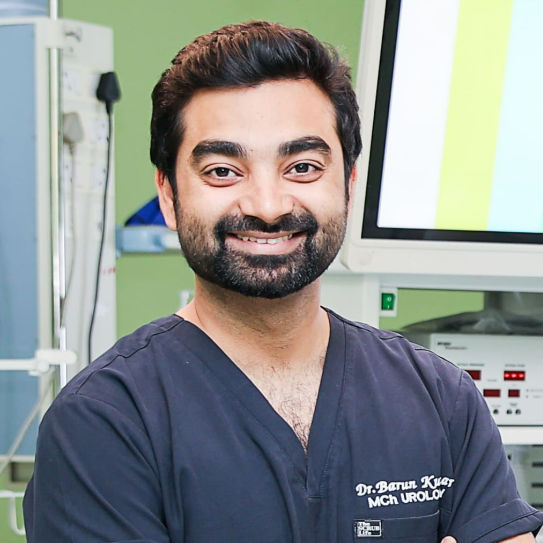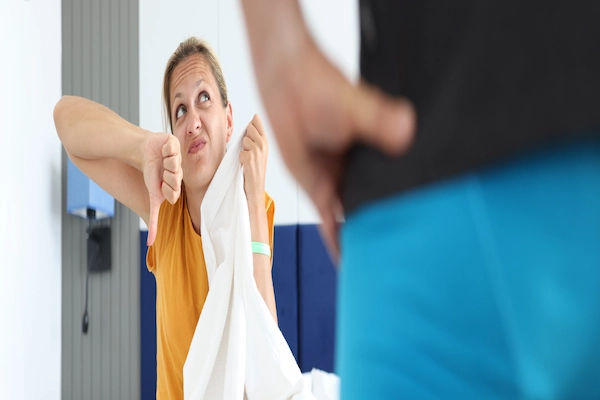Introduction To Premature Ejaculation
Learn about premature ejaculation, its common causes, symptoms, and treatment options. Understand how lifestyle changes, therapy, and medical approaches can help manage and improve sexual health.

Written by Dr. J T Hema Pratima
Reviewed by Dr. D Bhanu Prakash MBBS, AFIH, Advanced certificate in critical care medicine, Fellowship in critical care medicine
Last updated on 13th Jan, 2026
.webp?tr=q-80,f-webp,w-350,dpr-2,c-at_max 700w)
Premature ejaculation (PE) is one of the most common male sexual health concerns worldwide, yet it remains shrouded in silence and misunderstanding. If you're looking for a clear, compassionate, and actionable introduction to premature ejaculation, you've come to the right place. This guide is designed to demystify the condition, moving beyond the stigma to provide factual information, practical solutions, and hope. We will explore what PE truly is, its various causes—from psychological triggers like performance anxiety to biological factors—and the most effective treatment options available today. Whether you're experiencing this yourself or seeking to understand it better for a partner, this article will equip you with the knowledge to take the next step toward improved sexual health and confidence.
What Exactly is Premature Ejaculation?
Premature ejaculation is characterised by a persistent or recurrent pattern of ejaculation occurring during partnered sexual activity within approximately one minute of vaginal penetration (lifelong PE) or a clinically significant reduction in latency time, often to three minutes or less (acquired PE). Crucially, it must happen before the person wishes it and cause feelings of distress, frustration, and avoidance of sexual intimacy.
It's vital to understand that PE isn't about a single disappointing experience. It's a pattern that causes significant personal or interpersonal difficulty. The focus is on the lack of voluntary ejaculatory control and the negative impact it has on one's quality of life.
How Common is PE?
If you are dealing with this, know that you are far from alone. Global studies suggest that premature ejaculation affects between 20% to 30% of men at some point in their lives. This prevalence highlights that it is a standard medical issue, not a personal failing. Opening up to a healthcare professional is the first and most powerful step toward management, as they have helped countless others in the same situation.
The Two Main Types of Premature Ejaculation
Understanding the type of PE is key to determining the right approach to management. Clinicians generally categorise it into two types.
Lifelong (Primary) Premature Ejaculation
This type describes a man who has experienced early ejaculation nearly every time he has engaged in sexual activity for his entire life, since becoming sexually active. It is often more consistent and predictable.
Acquired (Secondary) Premature Ejaculation
This type develops after a period of normal sexual functioning. A man who previously had typical ejaculatory control suddenly or gradually begins to experience PE. This form often points to an underlying psychological or medical cause that needs to be identified.
Consult Top Specialists
What Causes Premature Ejaculation?
The causes are typically multifactorial, involving a complex interplay of psychology and biology.
Psychological and Emotional Factors
For many, the mind is the primary battlefield. Psychological causes are frequently at play, especially in acquired PE.
Performance Anxiety and Stress: The fear of not satisfying a partner or the pressure to "perform" can create a cycle of anxiety. This anxiety can trigger the sympathetic nervous system (the "fight or flight" response), which speeds up the processes leading to orgasm and ejaculation.
Depression and Relationship Issues: Underlying mental health conditions like depression can contribute to PE. Similarly, unresolved conflict, poor communication, or lack of intimacy with a partner can create emotional stress that manifests as sexual dysfunction.
Biological and Physical Causes
Research continues to uncover biological and physical contributors.
Hormonal Imbalances and Neurotransmitters: Serotonin, a key neurotransmitter, plays a crucial role in delaying ejaculation. Low levels of serotonin in the synaptic cleft are linked to poorer ejaculatory control. This is why SSRIs (Selective Serotonin Reuptake Inhibitors), which increase serotonin availability, are an effective medical treatment.
Inflammation and Genetic Predisposition: Some studies suggest that inflammation of the prostate or urethra can hasten ejaculation. Furthermore, evidence points to a genetic predisposition, meaning PE can run in families.
Effective Treatment Strategies for PE
The good news is that premature ejaculation is highly treatable. A combination of approaches often yields the best results.
Behavioural Techniques and Exercises You Can Try
These methods are often the first line of defense and focus on improving ejaculatory control through practice.
The Stop-Start Method (Semen's Method): This technique involves masturbating or having intercourse until you feel the urge to ejaculate. At that point, you stop all stimulation for 30-60 seconds, allowing the sensation to subside. Then, you restart. Repeating this process 3-4 times before allowing ejaculation helps you recognise the "point of no return" and build control.
The Squeeze Technique: Similar to the stop-start method, you or your partner stimulates until you feel pre-ejaculatory urgency. Then, a firm squeeze is applied to the head of the penis for several seconds, which diminishes the urge to ejaculate. After waiting for another 30 seconds, stimulation can resume.
Topical Sprays and Creams
These are anaesthetic sprays or creams (containing lidocaine or prilocaine) applied to the penis before intercourse. They reduce sensation, helping to delay ejaculation. It's important to use them as directed, often with a condom, to prevent transferring the numbing effect to your partner.
Oral Medications
As mentioned, off-label use of SSRIs like dapoxetine (specifically designed for PE), sertraline, or paroxetine can significantly increase latency time. Sometimes, medications for erectile dysfunction (PDE5 inhibitors like Sildenafil) are used in combination, especially if both conditions are present, as reducing anxiety about maintaining an erection can also help with ejaculatory control. It is essential to never self-prescribe these medications. A doctor can assess if they are right for you and manage any potential side effects. If your condition does not improve after trying behavioural methods, consult a doctor online with Apollo24|7 for further evaluation and to discuss prescription options.
Conclusion
Understanding premature ejaculation is the first step toward reclaiming control and confidence in your sexual life. It's a real, treatable medical condition, not a reflection of your masculinity or character. From behavioural exercises like the stop-start method to modern medical interventions, a range of effective solutions exists. The journey begins with breaking the silence—first by talking to your partner to foster intimacy and support, and then by consulting a knowledgeable healthcare provider who can offer a proper diagnosis and tailor a treatment plan to your specific needs. Remember, seeking help is a sign of strength and a proactive investment in your well-being and relationships. Take that step today.
Consult Top Specialists
Consult Top Specialists

Dr. Sudhakar G V
Urologist
25 Years • MBBS, MS(Gen.Surgery), DNB Urology
Bengaluru
Apollo Clinic, JP nagar, Bengaluru

Dr. Pradeep Champawat
Urologist
10 Years • MBBS, MS, DNB Urology
Delhi
Apollo Hospitals Indraprastha, Delhi
(175+ Patients)

Dr Anupam Sharma
Urologist
18 Years • MBBS, MS(Gen Surgery), DNB (Urology)
Delhi
Apollo Hospitals Indraprastha, Delhi
(25+ Patients)

Dr. Samiran Das Adhikary
Urologist
26 Years • MBBS; MS(General Surgery); Mch(Urology). Senior Consultant - Urology & Renal Transplant Surgery
Bhubaneswar
Apollo Hospitals Old Sainik School Road, Bhubaneswar

Dr. Barun Kumar
Urologist
12 Years • MBBS MS MCH UROLOGY DNB GENITOURINARY SURGERY
Guwahati
Apollo Clinic Guwahati, Guwahati
More articles from Premature Ejaculation
Frequently Asked Questions
1. Is premature ejaculation curable?
While some men, especially those with acquired PE, may overcome it completely by addressing the underlying cause (e.g., treating anxiety), for others with lifelong PE, it is about highly effective management rather than a definitive 'cure.' With the right techniques and treatments, most men can achieve satisfactory control.
2. What is the difference between erectile dysfunction (ED) and premature ejaculation (PE)?
They are distinct conditions. Erectile Dysfunction is the inability to achieve or maintain an erection sufficient for sexual activity. Premature Ejaculation is the inability to control or delay ejaculation once an erection is achieved. However, they can sometimes occur together.
3. Can masturbation habits cause premature ejaculation?
Certain habits developed during masturbation, such as rushing to orgasm to avoid being caught, can potentially condition the body to ejaculate quickly. However, masturbation itself is not a direct cause of PE. Retraining through the behavioural techniques mentioned can help counteract this.
4. How can I talk to my doctor about this without feeling embarrassed?
Remember that doctors are medical professionals who have heard it all. They approach sexual health clinically and without judgment. You can start by saying, 'I'd like to discuss a concern I have about my sexual health,' or be direct: 'I believe I may be experiencing premature ejaculation and would like to understand my options.
5. Are there any natural remedies for how to last longer in bed?
Some men find benefits in pelvic floor exercises (Kegels) to strengthen the muscles involved in ejaculation, mindfulness and meditation to reduce anxiety, and using thicker condoms to reduce sensation. While evidence varies, these low-risk strategies can be a helpful part of a broader management pla


